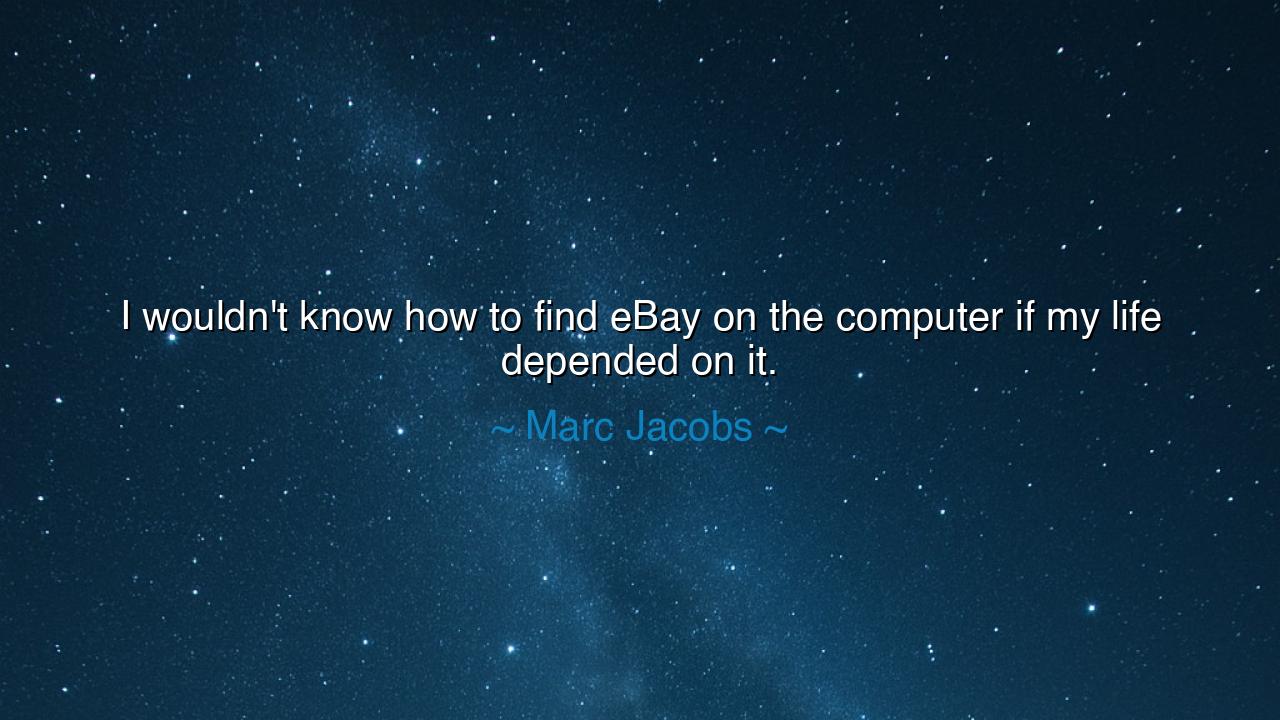
I wouldn't know how to find eBay on the computer if my life






In the age of ever-expanding technology, where the digital world envelops us all like a vast and uncharted sea, Marc Jacobs’ words stand as a striking declaration of human vulnerability and the limits of mastery. “I wouldn’t know how to find eBay on the computer if my life depended on it.” This quote, uttered by a man known for his profound mastery of fashion and design, reminds us that even the most accomplished individuals are not invincible or infallible. Expertise in one domain does not necessarily translate to mastery in another.
In a world consumed by the pursuit of technology and progress, Marc Jacobs’ sentiment speaks to an important truth—that knowledge is not a universal force that flows effortlessly into every aspect of our lives. Specialization is a powerful tool, yet it also places limitations on what we can claim to know. Just as a great warrior might wield his sword with unmatched skill yet remain unversed in the ways of a musician, so too can a brilliant designer stand at the edge of the digital landscape, helpless in the face of a tool like eBay, a mere website to some but a mystery to him.
Human nature compels us to seek out mastery in our chosen fields. But in this quest, we sometimes fail to notice the beauty of imperfection. The wisdom of the ancients reminds us that humility is the true hallmark of greatness. Like Socrates, who famously acknowledged, “I know that I know nothing,” Jacobs' words convey the same humbling truth. True greatness lies not in knowing everything but in accepting the fact that no one can ever be all-knowing. The eBay he refers to is but a symbol of all the things outside the realm of his expertise, a reminder that even the greatest minds have their blind spots.
Consider the story of Leonardo da Vinci, whose genius in painting and science was unparalleled. Yet even he, in his time, could not fathom the world of the digital. Da Vinci understood the vastness of knowledge, and the recognition of his limitations only enhanced the respect he commanded in his own era. He did not know how to build machines that could store the sum of all human knowledge, nor could he have predicted a world where a simple search engine could unravel the secrets of the universe at the click of a button. Yet, his humility and recognition of the infinite expanse of knowledge set him apart as not only a master in his field but also as a philosopher who was aware of his place in the grand tapestry of human endeavor.
Marc Jacobs too, with his admission of ignorance, reveals an important lesson for all who strive for greatness: humility is the key to understanding our true place in the world. One may excel in a particular craft, but this does not grant them omniscience. The path to mastery is often a long, winding road, and there is no shame in acknowledging what we do not know. To fight against this reality is to deny the inherent imperfection of human existence. It is a noble endeavor to pursue expertise, but it is equally noble to embrace that some areas of life remain beyond our grasp, and this should not diminish our value or worth.
The lesson here is profound. For those who labor in craftsmanship, art, or any specialized pursuit, Marc Jacobs’ words remind us that being human means we are all, in some way, incomplete. Just as the sun shines brightly in one corner of the sky, so does our expertise shine in one corner of the world. But no single person can illuminate the whole. We must look to others to fill in the gaps where our knowledge fails us. And in this pursuit, we must celebrate not just our victories but our limitations as well.
Lesson for the ages:
Embrace your limitations as much as your skills. True wisdom does not lie in knowing everything, but in recognizing what you do not know and having the courage to seek knowledge from others. Let humility guide you as much as your passions. The pursuit of mastery is an ongoing journey, and to claim perfection is to deny the inherent beauty of human life, which is always striving, always learning, and always evolving.
Practical Action:
Next time you encounter a task that lies beyond your current expertise, do not shy away from admitting your ignorance. Instead, seek the help of others, and allow yourself the freedom to learn without the burden of needing to be an expert in all things. Whether you are a designer, a warrior, or a philosopher, remember that no one person can know it all, and that is not only acceptable but also necessary for growth and progress.






AAdministratorAdministrator
Welcome, honored guests. Please leave a comment, we will respond soon